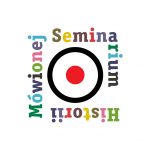
The Qualitative Data Archive (QDA), together with the Polish Oral History Association and the Faculty of Culture and Arts of the University of Warsaw, is organizing a pilot series of Oral History Seminars. These workshop-style meetings are dedicated to the analysis of interviews conducted within the field of oral history, both those stored in archives and completely new ones recorded as part of ongoing projects. The main initiator is Dr. Jakub Gałęziowski from the University of Warsaw. The meetings are patronized by the journal Wrocławski Rocznik Historii Mówionej (Wrocław Yearbook of Oral History).
On January 25th, the first meeting of the new series took place at the Institute of Philosophy and Sociology of the Polish Academy of Sciences (IFiS PAN). The first part was devoted to presenting the idea of the seminars and discussing how to implement it. In the second part, the participants jointly analyzed an interview conducted by Dr. Jakub Gałęziowski as part of the currently ongoing project “A Breach in the System: The ‘Polonia Firms’ 1976-1994”. The meeting was attended by 23 participants representing over a dozen institutions, including academic units, archives, and NGOs.
The upcoming meeting dates are February 22nd, March 22nd, April 26th, and May 24th. The seminars will take place at the Institute of Philosophy and Sociology of the Polish Academy of Sciences from 2 p.m. to 6 p.m. To join the mailing list and receive materials for the upcoming meetings, please contact the organizers at seminariumoralhistory@gmail.com.
From the side of the QDA, Dr. Piotr Filipkowski and Dr. Danuta Życzyńska-Ciołek are involved in the project.
